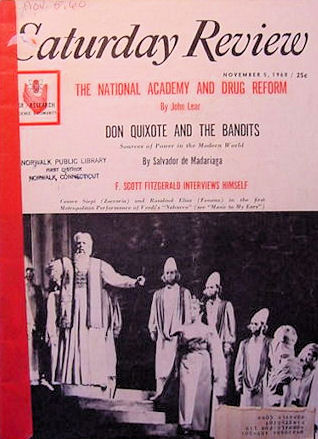
An Interview with F. Scott Fitzgerald
by F. Scott Fitzgerald
With the distinct intention of taking Mr. Fitzgerald by surprise I ascended to the twenty-first floor of the Biltmore and knocked in the best waiter-manner at the door. On entering my first impression was one of confusion—a sort of rummage sale confusion. A young man was standing in the center of the room turning an absent glance first at one side of the room and then at the other.
“I'm looking for my hat,” he said dazedly, “How do you do. Come on in and sit down on the bed.”
The author of This Side of Paradise is sturdy, broad shouldered and just above medium height. He has blond hair with the suggestion of a wave and alert green eyes—the melange somewhat Nordic—and good looking too, which was disconcerting as I had somehow expected a thin nose and spectacles.
We had preliminaries—but I will omit the preliminaries. They consisted in searching for things cigarettes, a blue tie with white dots, an ash tray. But as he was obviously quite willing to talk, and seemed quite receptive to my questions we launched off directly on his ideas of literature.
“How long did it take to write your book?” I began.
“To write it—three months, to concieve it—three minutes. To collect the data in it—all my life. The idea of writing it occurred to me on the First of last July. It was sort of a substitute form of dissipation.”
“What are your plans now?” I asked him.
He gave a long sigh and shrugged his shoulders.
“I'll be darned if I know. The scope and depth and breadth of my writings lie in the laps of the Gods. If knowledge comes naturally, through interest, as Shaw learned his political econemy or as Wells devoured modern science—why, that'll be slick. On study itself—that is in 'reading up' a subject—I haven't ant-hill moving faith. Knowledge must cry out to be known— cry out that only I can know it and then I'll swim in it to satiety as I've swum in—in many things.”
“Please be frank.”
“Well, you know if you've read my book. I've swum in various seas of adolescent egotism. But what I meant was that if big things never grip me— well, it simply means I'm not cut out to be big. This conscious struggle to find bigness outside, to substitute bigness of theme for bigness of perception, to create an objective Magnum Opus such as the Ring in the Book— well, all that's the antithesis of my literary aims.
“Another thing,” he continued, “My idea is always to reach my generation. The wise writer, I think, writes for the youth of his own generation, the critic of the next and the schoolmasters of ever afterward. Granted the ability to improve what he imitates in the way of style, to choose from his own interpretation of the experiences around him what constitutes material, and we get the first-water genius.”
“Do you expect to be—to be—well, part of the great literary tradition?” I asked, timidly.
He became excited. He smiled radiantly. I saw he had an answer for this. “There's no great literary tradition,” he burst out. “There's only the tradition of the eventual death of every literary tradition. The wise literary son kills his own father.”
After this he began entheusiasticly on style.
“By style, I mean color,” he said. “I want to be able to do anything with words: handle slashing, flaming descriptions like Wells, and use the paradox with the clarity of Samuel Butler, the breadth of Bernard Shaw and the wit of Oscar Wilde, I want to do the wide sultry heavens of Conrad, the rolled-gold sundowns and crazy-quilt skies of Hichens and Kipling as well as the pastelle dawns and twilights of Chesterton. All that is by way of example. As a matter of fact I am a professed literary thief, hot after the best methods of every writer in my generation.”
The interview terminated about then. Four young men with philistine faces and conservative ties appeared, and looking at each other exchanged broad winks. Mr. Fitzgerald faltered and seemed to lose his stride.
“Most of my friends are—are like those,” he whispered as he showed me to the door. “I don't care for literary people much—they make me nervous.”
It was really rather a good interview, wasn't it!
In 1920, a few weeks after the publication of “This Side of Paradise,” F. Scott Fitzgerald suggested to John William Rogers, then book advertising manager of Scribners, that he might write an interview with himself for use in publicizing his book. A few days later Fitzgerald handed him a rough pencil draft. The interview was not used, however, because, as Mr. Rogers recalls, “Fitzgerald was just one more young man with a promising first novel. An interview giving impressions of him and his literary opinions was of very little interest to anybody.” Recently Mr. Rogers came across Fitzgerald's manuscript, which had been filed away for nearly forty years, and made it available to The Saturday Review and published in . The manuscript, printed here exactly as the twenty-four-year-old Fitzgerald wrote it, has been given by Mr. Rogers to the Dallas Public Library.
This self-interview was partly published in Heywood Broun's “Books” column as Carleton R. Davis's interview with Fitzgerald, New York Tribune, 7 May 1920, p. 14.
Published in The Saturday Review magazine (#43, 05 November 1960, pp. 26, 56). This text scanned from F. Scott Fitzgerald on Authorship, ed. M. J. Bruccoli with J. S. Baughman (Columbia: U of South Carolina P, 1996).
Not illustrated.
